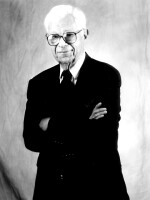ROBERT SIEGEL, host:
NATO is 59 years old this week. And NPR News analyst Daniel Schorr is taking the occasion of this NATO meeting to size up how the organization has evolved. He says the issue of which new members to accept, is not the only source of discord within NATO.
DANIEL SCHORR: Old alliances, like old soldiers, never die. They just fade away. And in the case of NATO, The North Atlantic Treaty Organization, they may even expand as they fade.
In 1949, 12 nations - the U.S., Canada, and Western Europe - united under the American nuclear umbrella. Its mission was simple: Deter a Stalin Soviet Union from aggression.
Nearing its 60th birthday, NATO meets in Bucharest Romania - once a communist enemy - and has expanded to 26 countries, several of them former Soviet Republics. And two more from Soviet Republics, Ukraine and Georgia, are knocking at the door seeking admission.
But NATO no longer snaps to attention when the U.S. whistles. Its members are mostly critical of the war in Iraq, and members, like Germany, have resisted sending more troops to Afghanistan. Defense Secretary Robert Gates says - warn that NATO risks becoming a two-tier alliance: those willing to share the load and the free riders.
All three candidates in the U.S. election have called for larger contributions from other NATO countries. Senator Barack Obama has promised to rally our NATO's allies for our common defense. Senator Hillary Clinton has said that Europe and the United States must work together. And Senator John McCain says that our commitment to Afghanistan must include increasing NATO forces.
It's been a long time, 59 years, since 12 governments signed a treaty to create a fighting force. Its mission was described to me as keeping the Americans in, keeping the Russian's out, and keeping the German's down.
In those days, our allies would standardize their weapons to be better able to operate with the United States. That is no longer true. NATO was one of the more successful alliances once when its member perceived a common enemy. Today with America, unpopular in many of the NATO countries, NATO goes on expanding his membership, but no longer has a clear mission or a sense of unity.
This is Daniel Schorr. Transcript provided by NPR, Copyright NPR.






